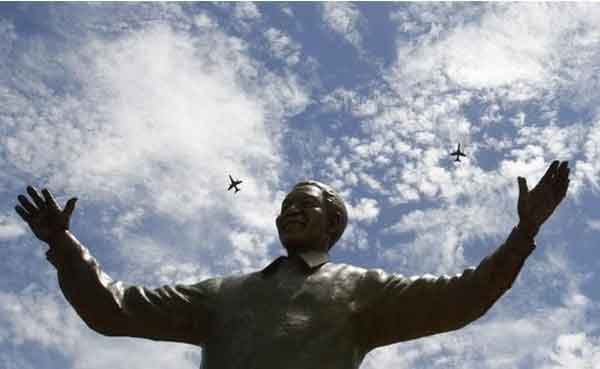
|
South Africa's government has ordered sculptors to remove a bronze rabbit they hid in the ear of a Nelson Mandela statue, unveiled after the former president's death last month. It wanted to "restore dignity back to the statue", a spokesman told the BBC. The sculptors reportedly inserted the rabbit as a trademark signature and to denote the haste with which they had to complete the statue. Rabbit in the Afrikaans language is "haas", which also means haste. "We don't think it's appropriate because Nelson Mandela never had a rabbit on his ear," Mogomotsi Mogodiri, the spokesman for the Department of Arts and Culture, told the BBC's Focus on Africa radio programme. "We'd want people to see that statue as a symbol of hope, not about something like a rabbit." Mr Mandela, who died at the age of 95, was widely acclaimed for his role in fighting white minority rule and promoting reconciliation after being elected South Africa's first black president in 1994. 'No trouser signature allowed' The nine-metre (30ft) bronze statue was unveiled on 16 December, a day after Mr Mandela was buried. It stands at the Union Buildings, the government headquarters in the capital, Pretoria. Mr Mogodiri said the sculptors had apologised for any offence caused to the government and Mr Mandela's family by placing the rabbit in the statue's right ear. "Discussions are on-going about when the rabbit will be removed. Government wants it removed as soon as possible to restore dignity back to the statue," he said. The sculptors, Andre Prinsloo and Ruhan Janse van Vuuren, said they had added the rabbit to the statue after the department refused to allow them to engrave their signatures on the trousers of the statue, South Africa's Beeld newspaper reported. They said it also represented the tight deadline they work under. "The time factor was big and at times we had to work hard," Mr Prinsloo is quoted as saying. He said the "small symbol" was hidden in the ear and it did not take anything away from the statue. "You need a long lens or binoculars to see it," he said. "During the moulding process a lot of people had seen the statue up close and nobody noticed it." Mr Mogodiri said the sculptors had never asked for permission to put their signatures on the statue, and the government was "taken aback" by their claim that permission had been denied. "Nothing of that sort happened. If a request was made, we would have considered it," he said. Mr Mandela died on 5 December after battling a recurring lung infection.
|
英國廣播公司1月23日報道,南非政府要求雕塑家移除“暗藏”在南非前總統曼德拉雕像耳朵中的銅兔。 南非文化部發言人莫葛莫斯·莫葛迪瑞說,“因為曼德耳朵上拉從來沒有過一只兔子,我們認為這種做法是不合適的。” “我們想讓人把雕像看作希望的象征,而不是兔子一類的東西。” 享年95歲的曼德拉1994年當選為南非首位黑人總統,因反對少數白人統治及倡導民族和解受到廣泛稱贊。 在曼德拉下葬的第二天也就是12月16日,這座9米高的銅像亮相,矗立在政府總部比勒陀利亞聯合大廈旁。雕塑造型為曼德拉伸開雙臂,寓意擁抱所有的南非人。 莫葛迪瑞稱,雕塑家已經就雕塑右耳中的兔子對政府和曼德拉家人所造成的冒犯進行道歉。 “我們正在討論什么時候來移除兔子。政府希望盡快移除,恢復雕像的尊嚴。”他說。 雕塑家安德烈·普林斯羅和羅翰··伍倫稱,他們加上兔子的目的是因為文化部拒絕了他們在雕像上留下自己簽名的請求。此外,兔子也代表雕塑工作很匆忙。 普林斯羅說,“這個小的標志”藏在耳朵里,需用長鏡頭或望遠鏡才能看到。“在制作過程中,許多人都近距離看到過雕塑,沒有人注意到。” 莫葛迪瑞稱雕塑家從來沒有要求過把他們的簽名放在雕塑上,政府對他們留簽名遭到拒絕的說法“感到吃驚”。“此類事情從來沒有發生過。如果之前確有請求,我們會認真考慮的,”他說。 相關閱讀 (信蓮) |
|
|
